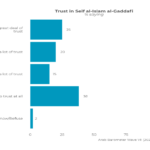This week’s mass murder in the Lebanese area of Baakline is a reminder that honor killings, while less frequent in Lebanon compared to other Arab countries, are more commonplace in Lebanon than is typically thought.
A man from the Harfouch family was detained today over the killing of 10 people including his wife, two brothers, and two Syrian children, a security sourced told Al Arabiya.
“The man claimed it was an honor killing as he suspected his wide of cheating on him, although it seems his suspicions were misplaced,” adds the security source.
While less reported than in other Arab countries, honor killings take place in Lebanon but groups who deal with such cases classify them as violence against women. Honor-based violence includes all acts of violence committed against a family member, often a woman, with the justification stated to defend the family honor.
“We refuse to label these crimes as honor killings, because this means that we are giving justification to a man’s actions against women. We prefer to call them women’s killings. We have had previous cases where men legitimized the use [of] violence against their partner over suspicions of infidelity,” says lawyer Leyla Awada from Kafa, an organization that fights violence against women.
That was the case of Manal Assi who was tortured in 2014 by her husband before she was killed, said Awada.
According to Kafa, there were nine reported completed or attempted killings against women last year in a country with a local population of around 4.5 million. The security source explains that honor-linked killings can be underreported in Lebanon, especially in certain areas such as refugee camps, where families hide such deaths from the public when relatives are involved.
Gruesome killings and honor-linked crimes take place intermittently across all Lebanese regions and there have been a handful of especially violent cases over the last several years. In 2013, a man from Akkar was beaten and castrated after eloping with a girl from a different community. That same year, a man killed his pregnant teenage sister in south Lebanon in what was seen as an honor crime. Baghdad Khaled Issa was stabbed by her brother in the coastal area of al-Wazzani. The investigation revealed that the girl’s pregnancy was the result of repeated rape by her brother.
In 2018, a mother killed her daughter in the coastal area of Khalde. The woman strangled her daughter before electrocuting and smothering her with a pillow, claiming it was to defend the family honor. Earlier in the same year, the body of a woman was also found stoned to death. According to Islamic law, sexual relations between a man and woman outside of a valid marriage are a crime punishable by death by stoning.
“Lebanon is a patriarchal society and the label honor killings… provides men with the right of defining their wife’s crime and punishing them, when they have other options they can resort to, such as divorce. We need to start defending the victim and not the criminal,” points out Awada.
On August 4, 2011, parliament annulled article 562 of the criminal code, which mitigated the sentence of people who claim they killed or injured their wife, daughter, or other relative after witnessing a transgression, such as an extramarital affair, to protect the family “honor,” according to a report by Human Rights Watch on honor crimes.
Yet Awada believes that another article of the criminal code, article 252, still allowed for sentence mitigation for crimes committed against women, often used by judges to shorten sentences, such as in Assi’s 2014 case.
Nonetheless, Lebanon seems to fare much better than other countries in the region. A 2019 survey undertaken by the BBC News Arabic by the Arab Barometer research network, showed that honor killings were considered acceptable by 27 percent of Algerians, 25 percent of Moroccans, 14 percent of Sudanese, 21 percent of Jordanians, compared to 8 percent of Lebanese.
Seham Khodr head of the Baakline women’s association fears nonetheless that as the economic and social situation worsens in Lebanon, violence and killings of women could multiply, and domestic violence against women is already on the rise in the country.
Read original article on AlArabiya English

